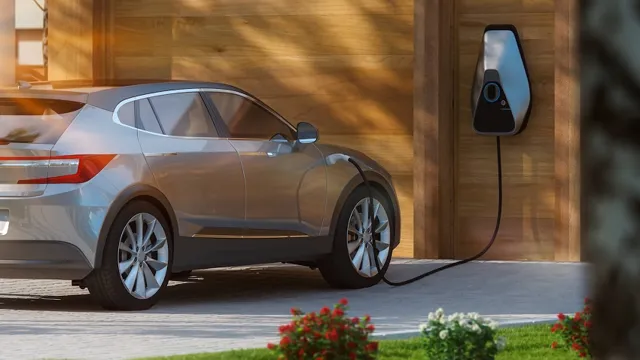Zapping Pollution: Exploring the Environmental Benefits of Electric Cars
Electric cars have been making headway in the automobile market due to their environmentally friendly nature. With the growing concern for the planet, many individuals are seeking ways to reduce their carbon footprint, and electric cars have become a popular solution. But you may be wondering, how exactly do electric cars help the planet? In this blog, we will dive into the impact electric cars have on the environment and why they are a smart choice for the future.
So buckle up and join us on this journey towards a greener planet.
Reduced Emissions
Electric cars are a much better option for the planet compared to traditional gas-powered vehicles due to their reduced emissions. When an electric car is being charged, there are zero emissions from the tailpipe, meaning no harmful pollutants are released into the environment. This is because electric cars do not rely on combustion engines to make them run.
On the other hand, gas vehicles emit exhaust gases, including carbon monoxide and nitrogen oxides, which are major contributors to air pollution and greenhouse gas emissions. Moreover, electric cars produce fewer emissions over their lifetime due to their long battery life and the fact that the electricity that powers them can come from renewable energy sources, such as solar, wind, or hydro power. This makes electric cars a greener and much more sustainable transportation option.
So, if you’re looking to reduce your ecological footprint, choosing an electric car is a great way to contribute to a cleaner and healthier planet!
Electric Cars Emit Less CO2
Electric cars emit significantly less CO2 than traditional gasoline-powered vehicles, which is one of the primary reasons they are becoming increasingly popular among environmentally conscious consumers. Electric vehicles run on batteries that are powered by electricity, which is generated from a variety of sources such as solar, wind, and hydroelectric power. This means that when an electric car is charged using renewable energy, it produces zero emissions.
However, even when the electricity used to charge an electric vehicle comes from non-renewable sources, such as coal or natural gas, the emissions produced are still lower than those from a traditional gasoline-powered car. Switching to an electric car may be a small step, but it can make a significant impact on reducing our carbon footprint and preserving the environment for future generations.

Electric Cars Emit Less Other Pollutants
Electric cars are widely known to be better for the environment, but did you know that they also emit less other pollutants than traditional vehicles? As a result, they help to reduce air pollution in urban areas and make our cities cleaner and more livable. Unlike gasoline-powered cars, electric cars do not emit harmful particles that can lead to respiratory issues and other health problems. Instead, they offer a cleaner and greener way of transportation that can help to reduce our carbon footprint and improve the quality of the air we breathe.
By driving electric cars, we not only get to enjoy the financial savings from lower fuel costs, but we also get to contribute to a healthier and more sustainable future. So why not make the switch to an electric car today? It’s an investment in yourself and the planet!
Renewable Energy Potential
If you’re wondering why electric cars are better for the planet, it all comes down to renewable energy potential. Unlike traditional gas-powered vehicles, electric cars are powered by clean energy sources such as solar and wind power. This means that electric cars produce zero emissions and significantly reduce greenhouse gas emissions that contribute to climate change.
Furthermore, governments around the world are investing in renewable energy initiatives that make it easier and more affordable to charge your electric vehicle at home or in public charging stations. As we move towards a more sustainable future, it’s important to consider how our consumer choices impact the environment. So if you’re in the market for a new car, consider switching to an electric vehicle and reduce your carbon footprint while enjoying all the benefits of a modern and efficient car.
Electric Cars Use Renewable Energy
Renewable energy potential Electric cars have become increasingly popular as people become more environmentally conscious, and they are an important part of the movement to shift to renewable energy. Renewable energy is the energy that comes from natural resources such as the sun, wind, and water that can be replenished over time. The potential of renewable energy is enormous, and it provides an alternative to the burning of fossil fuels that pollute the air and contribute to climate change.
As technology has advanced, the cost of renewable energy has decreased, making it more accessible to the average consumer. Electric cars use this renewable energy to power their engines, and they are an excellent example of how we can use this energy to reduce our carbon footprint and live more sustainably. By leveraging renewable energy, we can power our lives in a way that is both environmentally friendly and economically beneficial.
The potential for renewable energy is limitless, and it is time for us to explore and harness this resource to build a cleaner, brighter future for generations to come.
Potential for Future Renewable Energy Sources
The potential for future renewable energy sources is enormous. As the world becomes increasingly concerned about the impact of fossil fuels on the environment, the search for alternative energy sources has become more important than ever before. Fortunately, there are many renewable energy sources that show promise in meeting our energy needs without causing harm to the environment.
Solar power, wind power, and hydropower are three of the most promising sources of renewable energy. Each of these sources can be harnessed to generate electricity, and all are virtually limitless in their potential. Indeed, with the right technology in place, we may be able to meet all of our energy needs from these sources alone.
With continued investment and research, renewable energy is sure to play an increasingly important role in meeting our energy needs in the years to come.
Less Energy Consumption
If you’re wondering why electric cars are better for the planet, one major reason is that they consume less energy. Traditional gasoline-powered cars rely on internal combustion engines that burn gasoline and emit pollutants into the air. On the other hand, electric cars use rechargeable batteries to power an electric motor that produces zero emissions.
This means that not only are electric cars better for the environment, but they also require less energy to operate. Additionally, since electric cars are powered by electricity that can come from renewable sources like solar or wind power, they further reduce their environmental impact. So, not only are electric cars great for reducing air pollution, but they also help save on energy costs and promote a more sustainable planet.
Overall, it’s clear that electric cars are a smarter and cleaner choice for our transportation needs.
Energy Saved Through Regenerative Braking
Regenerative braking is a valuable technology used in many modern vehicles that can help reduce energy consumption. It works by using the kinetic energy generated during braking to recharge the vehicle’s battery, which can then be used to power the vehicle’s electronics or even the motor itself. This process helps to significantly reduce the amount of energy required to power the vehicle, as well as reduce wear and tear on the brakes themselves.
The benefits of regenerative braking are numerous, including increased fuel efficiency, extended battery life, and reduced emissions. In the end, this technology is just one of many ways that modern vehicles are becoming more sustainable and efficient, all while providing the same level of performance and functionality that consumers have come to expect. So, the next time you hit the brakes in your car, remember that you’re not just coming to a stop – you’re also helping to save energy and reduce your carbon footprint!
Efficient Conversion of Energy to Motion
When it comes to energy consumption, we always try to find ways to reduce our carbon footprint and increase efficiency. One solution is to improve the conversion of energy to motion. By using better technologies that enable us to transform energy into kinetic energy with minimal loss, we can reduce the amount of energy we use while maintaining the same level of output.
Think of it this way: it’s like driving a car. If you have an efficient engine, you can travel a long distance with less fuel consumption compared to an older, less efficient engine. The same concept applies to other forms of transportation, as well as various machines and equipment used in industries.
With less energy consumption, we can save money on energy bills, reduce our impact on the environment, and extend the lifespan of our equipment. One way to achieve efficient conversion of energy to motion is through the use of renewable energy sources, such as solar or wind power. Renewable energy systems allow us to harness natural resources that are infinite and sustainable, unlike fossil fuels that emit greenhouse gases and contribute to climate change.
Furthermore, by implementing energy-saving practices and technologies, we can also reduce the amount of energy that we waste. Simple actions like using energy-efficient bulbs, turning off appliances when not in use, and optimizing the heating and cooling systems in our homes can go a long way in reducing energy consumption. Overall, the efficient conversion of energy to motion should be a priority for us all, whether at home, work, or on the road.
By doing our part to reduce energy consumption and waste, we can help build a greener and more sustainable future.
Conclusion: Electric Cars Are Better for the Planet
In conclusion, electric cars are like the superheroes of the automotive world. They don’t emit harmful gases or pollutants, unlike their gas-guzzling counterparts. Instead, they’re powered by clean energy sources, reducing our dependency on fossil fuels and mitigating climate change.
Plus, they’re whisper-quiet, making our roads a more peaceful and enjoyable place to be. So, if you want to navigate the road less traveled and do your part for the planet, an electric car is the way to go. Plus, you’ll be the envy of all your friends, neighbors, and fellow drivers.
Who doesn’t want to be an eco-friendly, tech-savvy superhero?”
FAQs
What makes electric cars better for the planet compared to traditional gas-powered cars?
Electric cars are better for the planet because they produce no emissions and have much higher fuel efficiency compared to gas-powered cars. This means they emit less carbon dioxide and pollutant particles into the atmosphere, reducing air pollution and associated health risks.
How do electric cars contribute to reducing greenhouse gas emissions?
Electric cars run on electricity from renewable sources, such as solar or wind power, which produces no greenhouse gas emissions. This means that they can significantly reduce the amount of carbon dioxide released into the atmosphere, helping to slow down climate change.
Are electric cars more expensive to own and operate than gas-powered cars?
While electric cars may have a higher upfront cost, they are generally cheaper to own and operate in the long run. Electric cars require less maintenance, have lower fuel costs, and can be charged at home, reducing the need to visit gas stations. Additionally, tax incentives and rebates may be available to offset the initial cost.
What is the range of electric cars and how long does it take to charge them?
The range of electric cars varies depending on the model, but most modern electric cars have a range of over 200 miles per charge. Charging times can range from a few hours to a full day, depending on the charging station used and the car’s battery capacity. However, with advancing technology, charging times are decreasing and ranges are steadily increasing.



